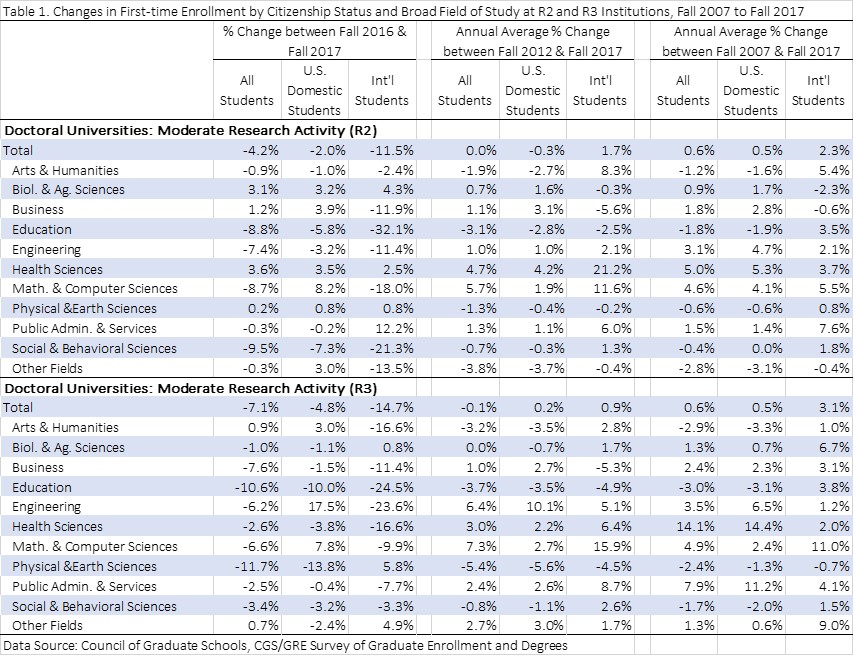You are on CGS' Legacy Site.
Thank you for visiting CGS! You are currently using CGS' legacy site, which is no longer supported. For up-to-date information, including publications purchasing and meeting information, please visit cgsnet.org.

Hironao Okahana, Associate Vice President, Research & Policy Analysis & Enyu Zhou, Education Research Analyst, Council of Graduate Schools
According to the 2018 CGS/GRE Survey of Graduate Enrollment and Degrees (GE&D), first-time graduate enrollment of international students at participating institutions declined by 3.7% between Fall 2016 and Fall 2017. This brief highlights some additional analysis pertaining to international graduate enrollment trends.
Key Findings:
- Despite the 3.7% decrease overall, at Doctoral Universities: Highest Research Activity (R1), first-time international graduate enrollment increased by 1.4% between Fall 2016 and Fall 2017. At other types of institutions, however, first-time international graduate enrollment decreased by double digits. (Figure 1)

- Compared to R1 institutions, proportionally fewer international graduate students attend other types of institutions. However, in some fields of study, such as engineering and mathematics and computer sciences, a large number of incoming graduate students at non R1 institutions are also international. (Figure 2)

- At R2 and R3 institutions, domestic first-time enrollment also declined between Fall 2016 and Fall 2017, and overall first-time graduate enrollment decreased by 4.2% and 7.1%, respectively. While there are fields in which first-time enrollment has been declining for some years, there are others that saw a sudden decline between Fall 2016 and Fall 2017. (Table 1 – next page)

Takeaway Points:
- A number of factors influence the global academic mobility of students; the Fall 2017 enrollment data suggest that the current U.S. visa policy and the uncertainties surrounding it may be, in part, impacting the flow of international graduate students coming into the United States.
- It appears that U.S. graduate education, broadly speaking, is still attractive to international talents, as is evident from first-time international graduate enrollment at R1 institutions. For other types of U.S. institutions, given the current political and policy climate, global competition for international graduate students may have increased.
- For R2 and R3 institutions, the decline of first-time international graduate enrollment comes in addition to stagnating, if not declining, first-time graduate enrollment of U.S. domestic students. If this decline becomes a pattern, it could pose a significant challenge to the health of graduate programs, particularly those programs with a large number of international students.
Conversation Starters: What do these data points mean for your graduate school and your programs and their strategic directions?
- How does your institution’s international and domestic enrollment figures compare to the national numbers? How does your institution compare to your peer institutions and graduate programs regionally and nationally?
- How have international graduate recruitment strategies at your institution changed in recent years? Has your institution historically relied on specific countries and/or graduate programs for international recruitment? How do you continue to strategically position your graduate school/programs in an increasingly crowded international marketplace?
- How are your graduate school and your programs responding to changes in both domestic and international graduate student enrollment? Do your graduate school and programs proactively engage current and potential employers of graduate degree holders?
Additional Resource:
CGS Strategic Consultations. The Council of Graduate Schools provides strategic consultations to member and nonmember institutions, boards, and state agencies as they make tactical decisions about the administration of graduate education. Our consultations draw upon extensive best practice and benchmarking research as well as the insights of experienced graduate deans from around the country. CGS also provides Custom Data Reports to help institutional leaders inform their strategic decision-making processes. Figures and tables in this brief and the full GE&D report can be customized to include institutions of your choice.
About the Data Source:
CGS/GRE Survey of Graduate Enrollment and Degrees is an annual survey of U.S. graduate schools, co-sponsored by CGS and the Graduate Record Examinations (GRE) Board since 1986. It is the only annual national survey that collects data on graduate enrollment by all fields of study and is the only source of national data on graduate applications by broad field of study. The report includes responses from 619 institutions and presents statistics on graduate applications and enrollment for Fall 2017, degrees conferred in 2016-17, and trend data for one-, five- and ten-year periods.
The brief was prepared by Hironao Okahana and Enyu Zhou. Ryan Bradshaw and Katherine Hazelrigg also contributed. Any opinions, findings, and conclusions or recommendations expressed in this brief do not necessarily reflect the views of CGS.




